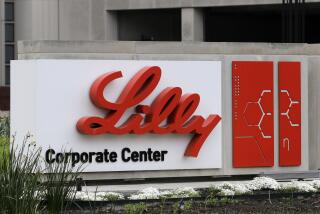Amgen bone drug cuts fracture risk, study finds
- Share via
NEW YORK — Biotechnology company Amgen Inc. released widely anticipated data Tuesday showing its osteoporosis drug candidate denosumab dramatically cut the risk of spinal and hip fractures in postmenopausal women, compared with a placebo.
Several analysts said the data supported denosumab’s position as a likely market blockbuster with annual sales of more than $1 billion, something Amgen sorely needs to offset declining sales of anemia drug Aranesp, which has been plagued with safety issues.
Shares of Thousand Oaks-based Amgen rose $3.70, or 6%, to $65.89 on Tuesday. They hit $66.51 earlier in the session, their highest point since February 2007.
In June, the firm announced that denosumab reduced the rate of spinal fractures in postmenopausal women, starting Amgen shares on an upward trajectory as analysts and investors eagerly awaited the study’s full results. Since that announcement, Amgen shares have climbed about 20%.
At the American Society of Bone and Mineral Research in Montreal on Tuesday, Amgen said data showed postmenopausal women taking denosumab cut their risk of spinal fractures by 68% and hip fractures by 40%. The late-stage clinical trial involved 7,808 women injected with denosumab every six months for three years.
Without head-to-head studies comparing denosumab with other osteoporosis drugs on the same patient population, there is no clinical way to determine the drugs’ exact comparative effects. But Wall Street analysts said the latest denosumab data supported the drug stacking up well against rival treatments already on the market called bisphosphonates.
Bisphosphonates are the most commonly prescribed treatments for osteoporosis, a condition characterized by weakening bones. Such drugs include Cincinnati-based Procter & Gamble Co.’s Actonel; Roche and GlaxoSmithKline’s Boniva; Fosamax from Whitehouse Station, N.J.-based Merck & Co.; and Novartis’ Reclast, which was approved by the FDA in 2007.
Reclast, which is administered annually via a 15-minute infusion, was shown to reduce risk of new spine fractures by 70% and of hip fractures by 41%.
Goldman Sachs analyst May-Kin Ho expects Amgen to file for Food and Drug Administration approval in late 2008 or early 2009 and said the drug had annual sales potential of $2 billion.
Cowen and Co. analyst Eric Schmidt is a bit less bullish, seeing sales reaching $1 billion annually by 2012.
He said it might be difficult for denosumab to dominate the osteoporosis market, but saw it becoming the drug of choice for the 20% of patients who couldn’t tolerate bisphosphonates.
More to Read
Inside the business of entertainment
The Wide Shot brings you news, analysis and insights on everything from streaming wars to production — and what it all means for the future.
You may occasionally receive promotional content from the Los Angeles Times.








